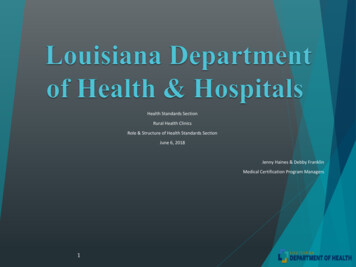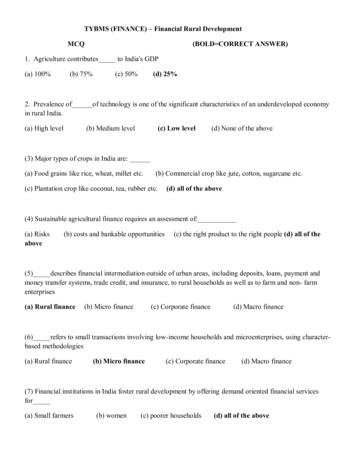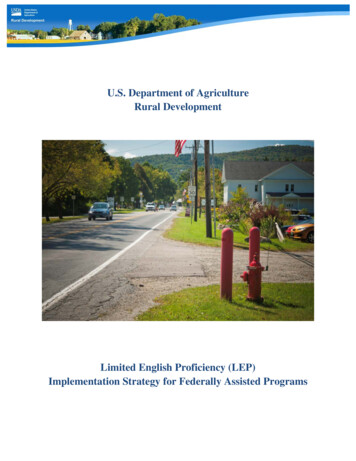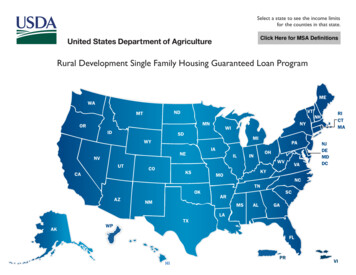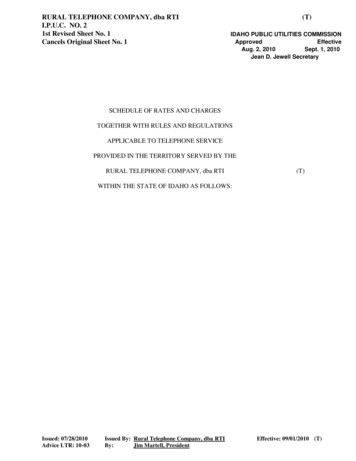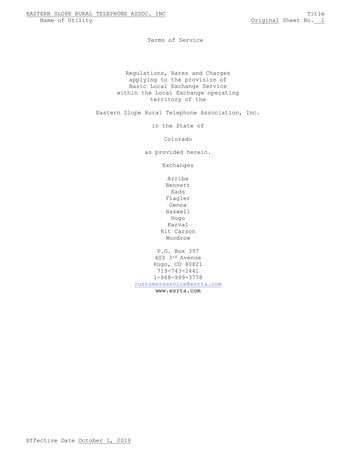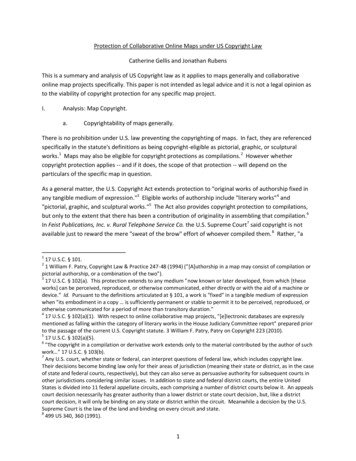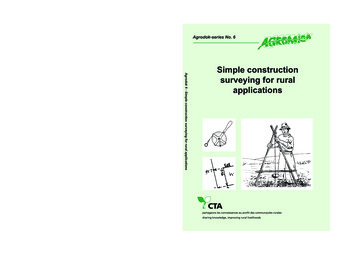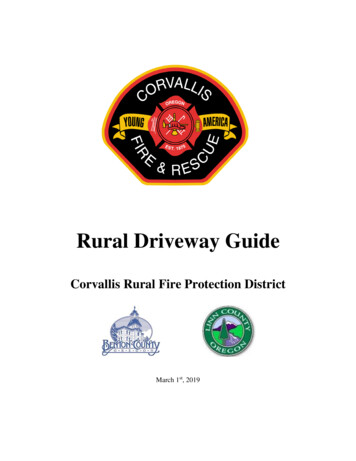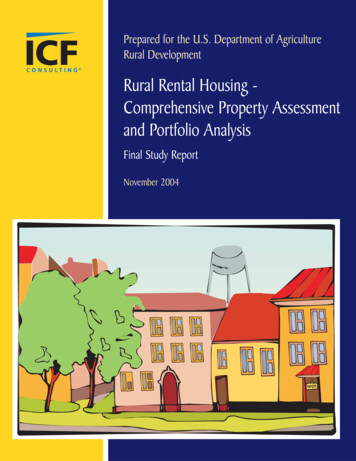
Transcription
The Role of RuralDevelopment Interventionsin Creating a SustainableSocietyIsabel ChenderRaquel Luna ViggianiZulma PatarroyoSchool of EngineeringBlekinge Institute of TechnologyKarlskrona, Sweden2014Examiner: Professor Henrik NySupervisor: Professor Karl-Henrik RobèrtPrimary advisor: M.Sc. Cesar Levy FrançaSecondary advisor: M.Sc. Brendan Moore
The Role of Rural DevelopmentInterventions in Creating a SustainableSocietyIsabel Chender, Raquel Luna Viggiani andZulma PatarroyoSchool of EngineeringBlekinge Institute of TechnologyKarlskrona, Sweden2014Thesis submitted for completion of Master of Strategic Leadership towards Sustainability,Blekinge Institute of Technology, Karlskrona, Sweden.Abstract: The inter-related social and ecological facets of global sustainability imply thatthe way society develops will impact the environment. Development presents complex,multifaceted challenges. Interventions in the developing world in the form of projects createdby the agencies, organizations and agents of the international development communityincreasingly appreciate and seek to address these challenges. Yet, to do soeffectively, interventions need to shift from fragmented, sector-specific approaches based onformal data reports to approaches that anticipate, adapt, transform, and learn. This researchaims to complement and support the practical and theoretical knowledge of ruraldevelopment agents with insights from practitioners using approaches that considercomplexity in other fields, in order to explore how development interventions could play arole in moving society toward sustainability. A prototype guide for rural developmentinterventions synthesizes results gathered from interviews with rural development agentswithin Latin America and learning experience designers into three levels: system, interaction,and personal. The Framework for Strategic Sustainable Development (FSSD) provides asystems perspective and unifying definition of sustainability. The interaction level presentskey recommendations, rationale, and methods for action, and the personal level presentsreflection questions. This research hopes to inspire mutual learning between developmentactors and communities.Keywords: development interventions, sustainable development, complexity-basedapproaches, rural community development, international development community, ruraldevelopment agents.
Statement of ContributionABOUT RESEARCHDESIGNWith grace and commitmentthree curly brunettesembark on a journeyof hope and despairConnecting their passionfor latin americawith the brainy worldof the academiaweaving of ideaslots of conversationsdoodles everywhereand help from our mentorsa constant revisionof goals and expectationsa very intense journeyhurray for the iterationif we speak of goalsconceptualizationoverall development ofwriting and methodswe can only speak of great cocreationABOUT METHODS, DATAGATHERING ANDANALYSISLiterature reviewswe all tried to tacklebut only Isas turned outas juicy as an applebuilding on her backgroundin international studiesshe could speak the linguaof the academiaa bit of a nerdas smart as a whipshe would keep us groundedbuddhism is her chipI’m sending this surveyZulma said one daywhere she needed actionand a break from her headWe all shared our networksand fruitful it provedwith interview datescalendar improvedso many great peoplewho gave out their timeto share us some learningand leave us inspiredOur interviewsnone of us would misslistening, note takingit was such a blissRaquel em portuguêsZulma en espanolIsabel in englishway to accomplish our goalExcel charts for sense makingthat’s Raquel’s domaincategories and patternsjust emerge in her brainWRITTEN REPORTDUTIESCollective discussionsfollowed by the writingR and Isa excellingand they keep smilingI will take two daysto format the textoffered the brazilianwe said “be our guest”PRESENTATION OFRESULTSGirls I am so sorryBut this makes no senseit needs to be simplerfeel the flow of Zoh so many versionsof the presentationswith different styleswe crafted those slidesDon’t forget citationsIsabel would sayvery much appreciatedby our good friend shaihere come the transcriptionsand the scary codingbut for these great peoplewe even enjoyed itFINAL VERSESOur knowledge we expandedLaughter, smiles and careexistential crisiswe hope we make senseAnalysing datawe all did our partdiverging convergingit was like a danceOn our contributionI could write for daysyou must read our paperwill you be amazed?post its on the wallthe whiteboard with doodlesbrains and hearts togetherprototype and noodlesthe sense making drawingsthe challenging questionsZulma’s contributionwith communicationsiiIsabel ChenderRaquel Luna ViggianiZulma Patarroyo
AcknowledgementsWe would like to express our sincere gratitude to our advisors César França and Brendan Moore,for their continuous support during our research, for their patience, motivation, and guidance.A special thank you to Tracy Meisterheim for always having time to give us that little extra helpand guidance.Thanks, Gracias and Obrigadas to Jane Baldwin, Sergio Beltran, Gerardo Berthin, Carlos Cerna,Angel Cruz, Wilder Mamani, Michael McGarrell, Camila Rodrigues and Valcleia Solidade forsharing their wonderful stories with us and taking us back, if mentally and spiritually, to ourbeloved Latin America.Gracias as well to Pablo Olmeno, whom we never managed to interview but whose lack ofavailability helped us be flexible and creative about how to go about our research.We want to especially acknowledge the contribution of the following people who inspired andchallenged us: Juanita Brown, Maria de los Angeles Cinta, Carlos Mota, Bob Stilger, ZaidHassan (additional thanks to Zaid for existential crisis #3.784) Maria Temmick, Ana MariaAristizabal, Rodrigo Alonso, Ezra DeKorte, Katie Morihead, Aerin Dunford, Deborah Frieze, LeAnne Grillo, Torsten Jorgensen, Maaiane Knuth and Pete Sims. Thank you for sharing some ofyour time, journeys, contacts, learnings and questions with us.A big thank you to Isabel Sandoval for the beautiful design for our prototype.We also extend our deep appreciation to our house mates Kate, Ana, Lamia and Zulma’s familyRowan, Ilona and Naira, for supporting us intellectually and emotionally, for listening to ourrants and for allowing us to transform our houses into working spaces and brainstormingparadises.iii
Executive SummaryThe socio-ecological challenge of achieving global sustainability given declining resourcesand increasing population is multi-faceted. The specific ways in which the humandevelopment of nations and populations is perceived and conducted is arguably a key part,given its implications for ecological resources. The development challenge is complex, andthus there is a need for research regarding how to effectively address this complexity toensure sustainability.This thesis examines how learning based approaches designed to deal with complexity cansupport rural development interventions in moving society towards sustainabilityIntroductionThe ecosystem services upon which society depends are being systematically degraded inways that cannot be sustained (IPCC 2014). Resources are being utilized faster than naturecan regenerate or replenish them, which could lead to unpredictable impacts upon the Earth scapacity to support human life (Robèrt 2010). The interconnectedness of society and theenvironment, and thus the interconnection between human development and ecologicalresources, ensures that human development will strongly impact environmental sustainabilityon a global level.This socio-ecological challenge is a multi-faceted, complex issue of which populationgrowth, anthropogenic activity, and patterns of development are a part. Developed nationsevolved at the cost of unsustainable consumption and production patterns that continue todrive the erosion of the socio-ecological fabrics of society and the ecosystem. This trendrepresents a risk to global society in terms of exhaustion of natural resources, loss ofbiodiversity and strains on food production. The question becomes: What will now happen ifdeveloping nations follow the path of developed ones?To encourage and guide developing nations to pioneer a move toward sustainable society,there is a need to understand what such a society would look like. The Framework forStrategic Sustainable Development (FSSD) is specifically designed to address the complexityof the sustainability challenge (Robèrt 2010). Given the unpredictability of the challenge andthe need for a common understanding of how society should take action towards a solution,the framework presents common principles to be complied with to foster socio-ecologicalsustainability. The FSSD also serves as a conceptual framework to guide a systemicunderstanding.The definition of the development challenge directly influences how the global system ofinternational development community responds to it. Based on different ways of classifyingdeveloped and developing nations, and the different indices and ways to measure this, thequestions that arise are: What is being developed? What does it mean to develop? How cannations develop?The programs designed and implemented by development organizations can be calleddevelopment interventions, as members or actors from outside of their target of “poor andvulnerable” developing communities intervene within the community to assist in differentdevelopment initiatives. These interventions are being transformed and redefined in light ofthe new call for sustainable human development from the UNDP that has arisen alongside theiv
growth of academic literature on complexity thinking in international development. Thesepoint towards a fundamental shift in mental models, strategic approaches, organizationalphilosophies, and performance approaches.Although the indices that underpin measures of development have recently become moreholistic and consider more multifaceted forms of development, there is still a fundamentalmismatch between the objective and the solution. Current interventions are fragmented andsector-based, while sustainable human development is complex and multi-dimensional. Toappropriately engage this complexity, interventions need to shift from fragmented, sectorspecific approaches based on a “silver bullet” solution, to approaches that anticipate, adapt,transform, and learn (Ramalingam 2013; Barber 2011). There needs to be more emphasis onlearning as a means of mutual transformation (Parsons 2002).This thesis seeks to explore the potential of learning as an approach to address the complexchallenge of human development. Therefore, the research questions are as follows:MethodsResearch design and methods - In order to guide the research and organize the multiple parts,Maxwell’s 2005 model for qualitative research design was selected due to its iterative naturethat allows researchers to consider complex, system-based questions (Maxwell, 2005). Usingthe FSSD as a conceptual framework and referring to defined goals to hold multiple levels ofobjectives, the researchers answered their research questions using exploratory interviews,semi-structured interviews, and a prototype with practitioner feedback.Groups and Analysis – The researchers conducted eighteen interviews with two differentgroups – rural development agents (Group A) and learning experience designers (Group B).Thematic Data Analysis charts, graphic recording, and a Five Level Framework were used toanalyse interviews from Group A, and transcript coding was used to analyse Group B.The Prototype Guide – The complimentary guide, which possesses the current working titleof: “Development Interventions toward a Sustainable Society,” was created by combiningfindings from the two fields of research framed with knowledge regarding systems thinking,complexity, concepts from Strategic Sustainable Development (SSD), and personal guidingquestions into a complimentary framework or work guide for rural development agents.v
Results and DiscussionResults are presented and discussed based on the three phases of research that correspond tothe research questions.Section 3.1 presents results collected through interviews with rural development agents(Group A) to describe the current reality and success characteristics of rural developmentinterventions. Information is organized according to the Five Level Framework that presentfive patterns regarding the system, fourteen characteristics that were present in successfulinterventions, four strategic guidelines, a list of actions, and a list of tools. A sustainabilitymaturity degree assessment conducted with the sustainability profile tool is also included.The discussion explains that in current practice, most rural development interventions facesystemic constraints, and given the need for results and lack of flexibility, base their designand implementation on generic reports and data, rather than on an understanding of thespecific situation on the ground, Interviewees noted several crucial success characteristics inretrospect, but found it difficult to incorporate these elements into design or find a rational ormethod by which to achieve them. Sustainability was considered important, yet definitionsand ideas regarding the role of interventions in promoting it were very diverse. Low maturitydegree scores on the sustainability profile suggest a low level of integration, yet manyinterviewees incorporate social sustainability into their work without naming it.Section 3.2 presents insights gathered from interviews with learning experience designers(Group B) to answer the second secondary research question regarding how thesepractitioners can support rural development interventions with their knowledge ofcomplexity. Findings are divided into categories of approach, actions, and tools that support,complement, and add to the success characteristics and actions identified by Group A. Aninterpretation of the overall results implies
listening, note taking it was such a bliss Raquel em português Zulma en espanol Isabel in english way to accomplish our goal Excel charts for sense making that’s Raquel’s domain categories and patterns just emerge in her brain here come the transcriptions and the scary coding but for these great people we even enjoyed it Analysing data
